Text
It feels like I have a secret. Something weighing heavy on my heart, and I’m itching to tell it. The problem is; it only feels like I have a secret. There’s nothing there. Nothing at all. I’m trying to figure out what it could be, or what it could have been. Did I misplace it? Did I forget it? Did it fall out? I can’t tell. I’m itching for vulnerability. For love. For lust.
These past few days I’ve been reading Confessions by Saint Augustine. He has such a longing for love. Such a connection to love. He says, Love is his weight. It’s what moves him any direction. Sometimes it is towards a girl, sometimes towards the Lord. Sometimes it leads him to a religion that helps him come to understand the conflict within himself. How can he make peace with the struggle within himself? Find something that consoles him, tells him that how he’s feeling is supposed to be that way and he might as well ignore it and indulge the good. This is my rudimentary summary of the first five books and what my tutors and lecturers have said. It’s a bit crude, it’s a bit of a bad paraphrasing, but this is how I’m coming to understand him.
See, he has this great big ball of tension pulling at him inside. He wants to be good, but he wants to be bad simply because in being bad it is a rebellion against the order of the world and through that it affirms himself. It gives him authority over something in this world. He does bad actions for the satisfaction of themselves and no other good. And to him that’s more evil than murder which is done of a perverted necessity.
These are his confessions, his accounts of figuring out things in his life. The story of him making mistakes over and over and what he makes of them. There is a lot of lust. There is a lot of Augustine simply wanting to be loved because he’s in love with the idea of love. Burning passionate love. Of being idolized and to Idolize someone, and he’s willing to pay the price of the jealousy, because one knows it’s impossible to ever fully know that they love you completely.
He’s a bundle of mess. And when you feel like a bundle of a mess, it’s reassuring that one of the most brilliant men in time has felt as you did, especially when you know it was in a time so long ago.
Inside me there’s this conflict, and there’s nothing provoking it, not really. Perhaps stress, but it doesn’t feel like that kind. It’s this longing. It’s like Augustine’s weight. It’s a longing for love.
0 notes
Video
youtube
For the First day of my university class, we read gilgamesh...
0 notes
Text
The course which I created this blog for is sadly coming to a close
but, I'd like to keep up with this blog. I am after all taking a 'crash course great books' year next year, and prepping in the summer using this blog would be fantastic. :)
Long story short, I'm not gone.
0 notes
Text
CP- Part Two Literature and How It Currently Engages my Imagination and Intellect
“Man’s Longing for Paradise is Man’s Longing not to be Man.”
- Milan Kundera
#milan kundera#unbearable lightness of being#john green#paper towns#Tess of the d'urbervilles#thomas hardy#catcher in the rye#J.D. Salinger#books#novels#authors#writers#conventions
0 notes
Text
CP- Part One- The Groundwork: Literarure and how It engaged my imagination and intellect when I was young
I can remember clearly as a young child thinking that every decision I made was important. I would spend hours collecting, browsing, reading backs and covers of books to try and decipher which book was really worth all that time, energy and emotional investment in. That said, sometimes I would allocate my time to books just to simply be engaged, immersed and swallowed whole by a posh little fantasy world. Other times, I just took too long to decide and my mother grabbed a book out of the pile and forced me to read it; the story of how I came to read six of the twelve lavish Gossip Girl books by Cecily von Ziegesar. (You get hooked after the first one.) Mostly when it came to the kinds of books I read when I was younger I always wanted there to be something challenging with them. In grade five I read Elsewhere by Gabrielle Zevin which tells the story of a girl who dies in a bike accident and finds herself in an afterlife where everyone ages backward till they return to earth. As a ten year old this was an idea that grabbed my imagination and forced me to look on my beliefs and question “what happens after you die?

The following year I read Feed and Thirsty both by M.T. Anderson. Feed to this day remains one of my favorite novels, it tells the story of teenagers in a future where computers are directly inserted into our brains. They allow us to message telepathically, watch television in our head, and get news on the latest sales as we walk in malls. On the surface the ‘feeds’ in their heads seems like a good idea the book had me questioning how safe technology is, and it gave me a paradise lost convention. Of course I didn’t really know what that was at the time, but I was starting to make connections. The main character, Titus, falls in love with a girl he met on the moon named Violet. After a clubbing accident with a hacker all their feeds go temporarily down, all recover well except Violet who had the ‘feed’ microchip installed in her head a lot later in life then her new friends. The damage is slowly killing Violet and Titus has to watch. It posed the question of what will happen to our society if we keep moving along with these ideas of consumerism. Obviously the books views were negative, but it gave me a chance to question them. It was and still is haunting the lack of control they were given over their own minds, brains, bodies, thoughts and lives.
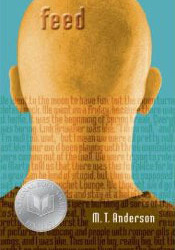


In grade six or seven, I read this ridiculous book by Pete Hautman called Rash. It’s quite possibly the most preposterous, ludicrous story I’ve ever read, but the concept. The abstract ideas behind it are horrifying. The basic plot is : it’s the year 2074 and all contact sports have been made illegal, one is only allowed to run indoors on a track made of squishy foam. The protagonist, Bo, finds himself in a prison for spreading a rash around his school. The prison is in the canadian tundra where he is forced to make pizzas everyday and his cell mate is there because he’s too fat. The two of them end up on an illegal football team while they’re there and in the end Bo’s rouge computer science project attempts and succeeds to bust him out of jail. This sounds nuts, and it was especially insane to read, but because it was so fast of a read there is a lot of time afterwards to process just exactly was the message was. Hautman caused me to reevaluate people’s obsession with safety. The overbearing protectiveness, the whole concept that someone knows what’s best for you and how to look at authority.
These are all books I read in middle school or before, but it’s evident what stuck with me. The stories that made me think. That engaged my imagination to conceive a world slightly different from my own and conjure up the ideas that came along with the slight changes. I was forced to think of life after death, of consumerism and just in control are we our own minds and thoughts, and to question what is safe and who do I listen to ? A reoccurring theme in all of my childhood favorites is this longing instilled in the stories that the past is better. The present is a possibility to change these possible futures.
#gossip girl#books#novels#writers#authors#pete hautmen#rash#gabrielle zevin#elsewhere#M.T. Anderson#thirsty#Feed#childhood books#reading#literature#Y.A.
3 notes
·
View notes
Text
I'd lost the password to this blog, please forgive my lack of updating !
I have a post in the works which will talk about literature ( my favorite books ) and how it can expand the mind both in intellect and in imagination.
0 notes
Text
Speaking of Holden Caulfield...
( this will be a short post )
We had our discussion on Catcher in the Rye today. The really cool one where everyone's parents came in and gave us other perspectives on our lonely character . They seemed to stress the idea of Holden having a mental illness, and whether or not that meant we were seeing mental illness through the lens of an adolescent or adolescence through the lens of mental illness. They looked closer at the parenting, and how didn't his parents see there was something going wrong, because he clearly showed signs of a manic episode. But at the same time, how did they not see the signs when they were teenagers, he smoked, he drank, he barely ate or slept...ect.
It was interesting. The more the book went on, the less the general population of our classroom seemed to relate or admire or even like Holden as a person.
0 notes
Video
youtube
Remember when I wrote about Paper Towns as my first entry ? Well, here is that book's author talking to us about The Catcher in the Rye. Enjoy. :)
2 notes
·
View notes
Text
I warn you, this is going to sound bad.
Hopefully, you'll forgive me because of the head space I'm in. Well, it's because of the head space I'm in that allows me to write this post, and ( here's the tie to English Literature ! ) understand Tess from Tess of the d'Urbervilles.
I hope you recall I mentioned that I was about to have Day 2 of my assessed discussions on Tess as well as another novel, Alias Grace by Maragaret Atwood. There was an outline of questions that we were to discuss or use as a tool to start a conversation and keep it going. My group went all over the place, in both days of the discussion from " which book has more redeemable male characters ? " to " which book has a stronger sense of hope at the end? " (Note * there will be spoilers and Note * there were also other questions that weren't such either or based )
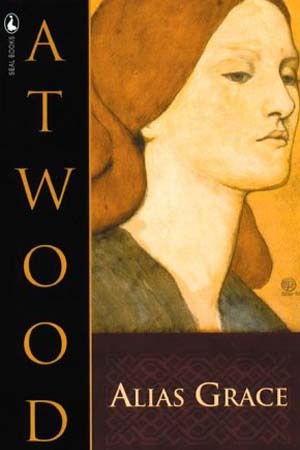
Hope. Which one had a greater sense of hope, I suppose that means I'll have to start by telling you what Alias Grace was / is about.
Quick Summary : Atwood wrote a book about a true murder case that took place in the 1850s in Toronto / Richmond Hill. James Mcdermott and Grace Marks were convicted of killing her employer and his mistress. James was hung, while Grace escaped the death sentence and was left to lead the rest of her life in asylum and in a penitentiary. ( what happened to quick ? ) The novel takes place mostly in first person perspective of Grace's head and Dr Simon Jordon who is trying to analyze her brain. ( I suppose...I'm still working on effectively summarizing things ) Back to Hope. In the end of Tess, she is captured and most likely put to death for committing murder, while Grace is free to go and marries little Jamie in the countryside. It sounds obvious which was more hopeful, but I stood strong with my sappy little point.
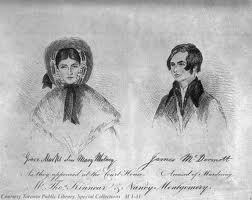
( Sketches of James Mcdermott and Grace Marks )
After the event in which Alec raped Tess (we are taking this for fact, though there is some debate) all Tess ever really wanted to do was die. She was suicidal. Examples are numerous.
To name a few :
1) After her baby sorrow dies and she wonders about the date of her death
2) When she speaks to Angel about the wall of days before her shouting " beware ! Beware "
3) After Angel rejects her and she says was was going to hang herself
4) when Angel sleep walks her to her grave and she wishes she could fall into the river and drown in his arms
5) At the d'Urbervilles grave and she says she is on the wrong side of this gate
Lets Toss away the side of that most people, including me (some of the time) see angel as a -insert curse word here- and didn't like it when he came back for her, Tess enjoyed it. Tess after all her miseries was allowed some happiness, and then was allowed peace to die. Inferred from the " I am ready " she speaks as she willingly walks to her doom.
It was frustrating to most people, but to me, it was somewhat hopeful. Tess after all is a classic Tragic hero where the tragedy is bound to happen because of their fatal flaw.
It is restful, tragedy, because one knows that there is no more lousy hope left. You know you’re caught, caught at last like a rat with all the world on its back. And the only thing left to do is shout—not moan, or complain, but yell out at the top of your voice whatever it was you had to say. What you’ve never said before. What perhaps you don’t even know till now.
- Jean Anouilh (Antigone 1943)

( Above, a nice summary of the original trilogy of which Antigone fits into, you know with courser language...it's last one in case you were wondering )
Perhaps it's not hope, but just utter peace as 'The Chorus' in Anouilh's adaptation of the Classic Greek Tragedy Antigone suggests.To me, it felt this way because Tess was depressed, even when she was happy. She couldn't stop feeling like she shouldn't feel as she did. She took no sympathy, not that much was offered to her, though she displayed it to others, such as when she broke all those dying birds necks. Tess keeps living because unlike those birds who have been shot, she feels and is told that what she has suffered was of her own fault and has NO right to feel that way, and she beats herself up further for feeling as she does. It's that tension that makes it a relief.
And this is where you're all going to rant at me, and get really mad. It's that emotion ( watch my words) that I can relate to. No, I can't relate to being a fallen women in the 1890s with rigid social conventions that won't allow me to have severe depression after the death of my child that was born through rape. Fortunately, I have never been raped. But I understand that feeling of feeling horrible and feeling like you have no right at all to wish such awful things upon yourself. If you have that emotion, it really amplifies Tess's strength not to harm herself and to even accept happiness for the short period in which she agrees to marry angel and hasn't yet felt guilty. She can't let herself be happy, because she feels that her previous ill emotions over 'nothing' ( for it was her fault * winces over how untrue that statement is* ) don't allow her to have happiness. She needs to pay for both the act and the emotions.
A lot of people in my discussion group felt as if Hardy's character's fell flat and were two dimensional and therefore they couldn't relate to them. While I agree that Hardy's main focus was the plot and that Tess seemingly is there just to perpetuate that 'modern tragedy feel', Tess is dimensional, and so is Angel Clare. ( if interested I may make another post because I did find some brief evidence ) It's both Hardy's delicate imagery & subtle ( something that made me mad ) symbolism, as well as his characters that have made me make three posts on this novel. That being said, Hardy really should have stuck to Poetry, he really is good at that. ( More to come on that ! )
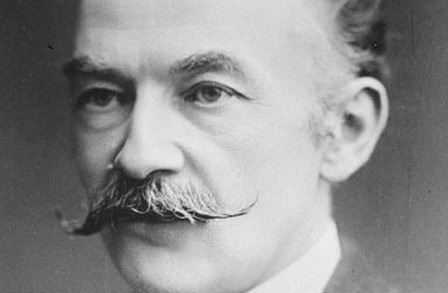
( Thomas Hardy. Look at the mustache ! )
2 notes
·
View notes
Photo
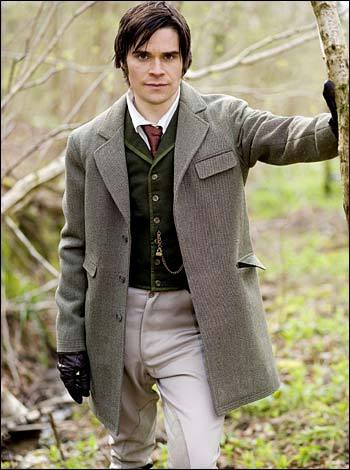
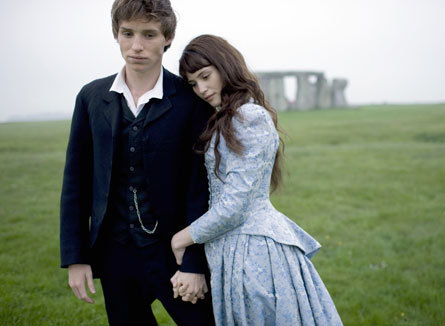
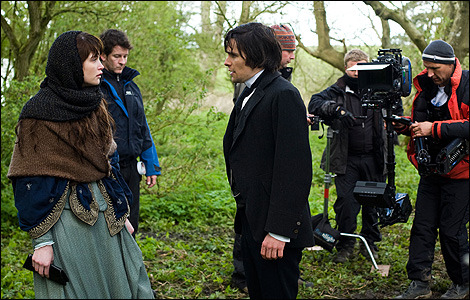
( pictured Hans Matheson portraying Alec D'Urberville, Eddie Redmayne portraying Angel Clare and Gemma Arterton portraying Tess Durbeyfield in the 2008 Tess of the D'urbervilles mini series)
In my English core class we watched the mini series version of Tess of the d'Urbervilles ( or at least most of it) and in the film adaptation I find the characters to be more two dimensional, except perhaps Tess herself who seems to be less wallowing in her own woe. Alec is extra scuzzy, you can even tell just by that photo, and Angel and Tess's love is more serene and perfect. Sort of.
This is what really raised my expectations of hating both of them in the novel, and perhaps even liking Alec. You could so obviously tell which the director wanted you to like, which in return made both Angel and Alec unappealing. But because Hardy gave more insight onto who Angel was, I found reason behind why I was supposed to like him and I fell just as Tess did.
Today I had an assessed discussion on many questions in Tess, and one of the topics that came up while we were struggling to come to a conclusion was that of Angel Clare. What did we think ? I was just bombarded with Angel hate, and I could understand why, but I sympathize with Angel and I can't bring myself to hate him. I understand all the harm he did to Tess, and that it was just plain stupid to go to Brazil and leave his wife, but I truly believe he came back because he realized he loved Tess not just this idealized version and not because he felt guilty. I need to find evidence to show his repent ( is that the correct word ? ) because so far it ain't looking so hot. Maybe I just enjoy arguing devils advocate, I'm not sure. Evidence at the end of the novel points to at the most the regression of Angel. There are apparently signs in his treatment and reaction to Tess which demonstrate his lack of growth or change in the novel. I am determined to find some that indicate what I believe Hardy probably wanted us to believe. Why would he allow them to get back together and call it fulfillment if Angel was unchanged ? Unless it all always had to do with Tess, but Angel remains the only character fully dimensional in the novel, in not only my opinion but that of my group.
You can see this in his guilt, his strong will, his rejection of the church, his idealistic nature. There are more examples...that I need to think of and get back to you after Day 2 of these assessed discussions.
5 notes
·
View notes
Text
I finished Reading Tess of the d'Urbervilles
I was pleasantly shocked that I enjoyed it. I was most surprised by the fact that I became so emotionally invested in the characters that I once or twice (read as a dozen) shouted out angrily at the actions of the characters hoping that somehow I could change the course of the novel. I had also gone in fully knowing the major plot point, character traits and imagery and still there was so much I didn't know. Little things, sometimes they were events, but mostly it was the way Hardy described the thoughts of his characters. It was only once inside Angel or Alec or Tess's head that I truly understood them. I really expected to like Alec and despite Angel. I know, it's backwards, but I tend to have irrational feelings over the exaggerated bad boys ( really, I'd give you a list of all the crazies in movies and television shows I've swooned over but It would be far too long) but fell into the normal trap. I anticipated some ill feeling toward angel after all my teacher's speak of how he fell in love with an idealized vision of Tess, but I couldn't feel that way. If you don't isolate yourself from the words Hardy writes it's impossible.
The way he portrays Alec makes my skin crawl. I believe from the instant you met him you knew he was disgusting. He just assumed control over Tess even on their first meeting, telling her that it was okay that he force fed her the fruit. ( Please tell me I didn't read that wrong) He was slimy in every sense, not just bad, SLIME-Y. Yuck.
As for Angel, I really did fall in love as Tess did. The dreamy air Hardy painted, the lust you felt from both parties, it was so contagious. I was often sighing along with Tess. And Even when she told him of her past and he rejected her, I could understand why. It's that moment when you realize your morals are stupid but your pride gets in the way and you go along with them pretending they are still yours. He had to carry with him the image of Tess as pure, and when he found out she wasn't, it was less to do with Tess and more to do with himself. At least that is what I perceived, for I think when he went away he realized this and that he loved her, and not just the wild new sprung child he thought she was. He has just temporarily deceived himself about those bits, but all the same he did love those bits about her.
That is my position, and I'm sticking to it. I'm chuckling. I did not image to be so firm and stubborn about this book. It was nearly the death of me trying to read it. Ten pages would take me 15 minutes to read. Roughly, sometimes longer. I'm a fast reader, so I don't know how this happened. Maybe it was all the description or my odd need to underline every single color written in the book. I really don't know why I actually did that. My teacher said to take note of colors and how they're used and I got stuck in that and I actually did. I feel like it added to the story. I can see each phase among a color wheel, and which parts exploded with colors and which ones stayed oddly dry of them.
Anyways, life beckons. I do recommend Tess to others, but please, take your time reading it. Have lots of time to read it, I can't tell you how many times I passed out trying to read it. Actually I think it was about four. Twice mid day.
2 notes
·
View notes
Text
Much Ado about Nothing
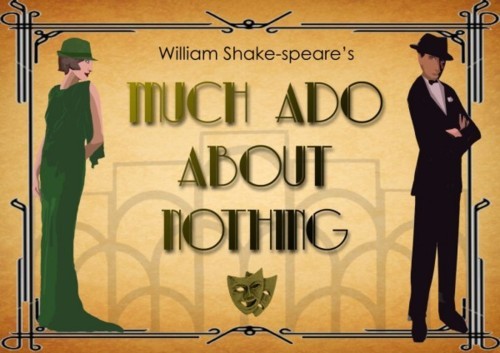
I play a very small role in our school's production of the Shakespearean play Much Ado about Nothing. Well, actually it's a number of small roles, including a non speaking part we made up and named Jules. I still have lines, and I'm enjoying it, but the rehearsals that go till eight pm are a bit tedious. That said, I did choose to be in this production and I love learning the play through playing. Sometimes I have to remind myself that I'm not walking on stage to my doom to say my couple of lines, and that a play is designed to be fun. Especially this one, being one of Shakespeare's comedies.
A lot of people find Shakespeare dull, and boring and can't understand anything he says, which I can relate to some of the time, but over all I'm on the side that's made Shakespeare carry on through the ages, an admirer.Truthfully, from what I've studied I enjoy his tragedies because although they all end badly, they seem a bit more possible, because quite frankly the idea that Hero would still marry Claudio at the end is beyond me.
I want to know what makes his plays valuable. What is it about them that people enjoy playing them and watching them hundreds of year later. I want to know as someone who has written a play how to make my characters as distinct, how to infuse the lines with themes and feelings, so that when Lady Macbeth can't rub the spots of her hands or when King Lear tries to convince us Cordelia is alive that we almost cry or that when Benedick and Beatrice banter on can't help but laugh.
They're so mysterious to me, and as a writer I want to learn from them.
0 notes
Photo
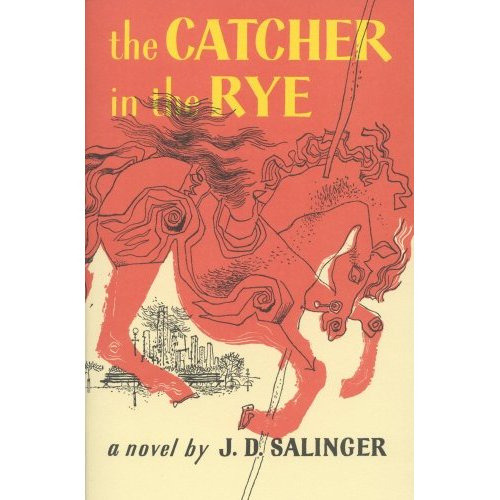
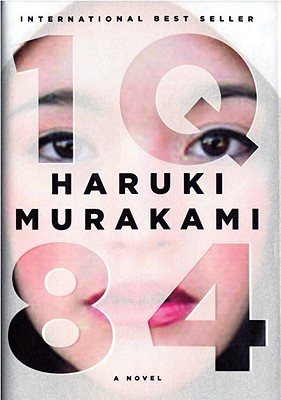
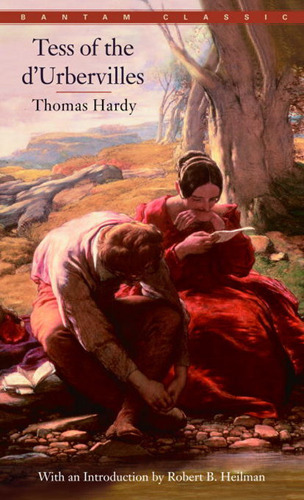
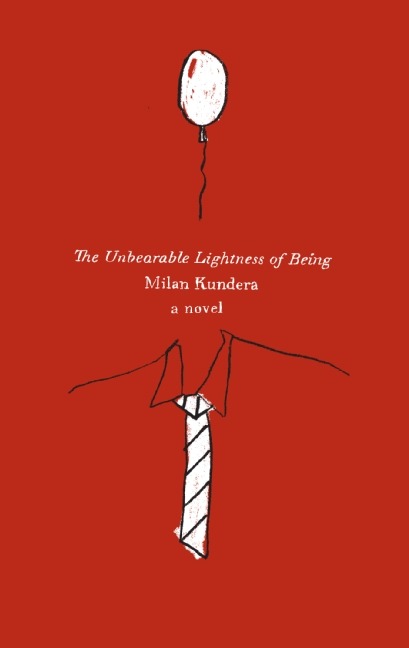
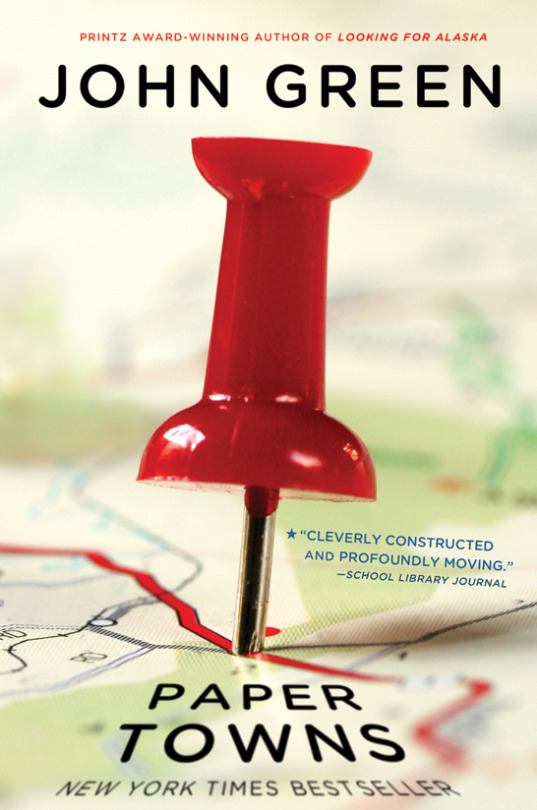
I've decided this blog has too much doom and gloom and to liven it up with some pictures :)
So here are some photos of the books I've mentioned thus far.
#paper towns#john green#catcher in the rye#J.D. salinger#haruki murakami#1q84#Tess of the D'Urbervilles#Thomas Hardy#Milan Kundera#the unbearable lightness of being
5 notes
·
View notes
Text
1Q84
I started reading Haruki Murakami's novel loosely based on George Orwell's 1984, entitled 1Q84. It's a massive book, not at all in small measurements, just over 900 pages and large enough not to fit in a small purse, which sometimes is frustrating because I like to read while on public transit. Nevertheless I'm a ninth in and it's plot is already vastly interesting. The book switches every chapter from a woman Aomame who you meet in a cab in busy traffic on her way to a very important meeting, to a man named Tengo who appears to be involved in a literary world particularly in a story contest. So far what links Murakami's novel and Orwell's is superficially the year in which they take place, 1984 and this mystical element that is starting to emerge. In Aomame's tale, she makes a decision to get out of the cab we first met her in and starts seeing the world differently. She starts to take note of changes in her present that alledgley happened in the relative past that she cannot recall. As for Tengo, he finds himself fixated on high school student's story, who he decides is told without tact but carries a sort of willed importance. The story itself is urgent with this otherworldly essence.
And that's as far as I've gotten in the first hundred pages. But Murakami is approaching the status of one of my favorite authors, which isn't too difficult because I rarely read more than one book by an author, unless of course it's in a series ( which I still don't really like) . Perhaps it's his eastern cultural influence and maybe it's just the stories he has to tell, but the couple of books I've read by him are wonderful.
I decided to read this book when I was perusing through the bookstore trying to spot RISK for my older brother's Christmas present and 1Q84 jumped out at me. At first I thought it was a republishing of some sort of Orwell's novel, but it was far too large and unfamiliar. I had read 1984 this summer due to my new love of dystopian novels I received from a course I took while on exchange. I had studied Brave New World and that was it. There was something so quenching about them. They were a study on the world we knew, while giving us something so ridiculous. 1984 claimed that the world is paranoid and controlling with big brother watching you, and ministries purposely built to change all existing pasts (which is much like what Murakami is recreating with Aomame's story line in 1Q84). Brave New World tried to show us what liberating us sexually and creating people for specific jobs would do, and what savage and civilized meant. I've since even read other novels, like Margaret Atwood's Oryx and Crake and it's sequel The Year of The Flood, which spun a tale of a world highly consumerised and segregated that one man decided to significantly alter.
I remember thinking a curious thing these dystopians all had in common was this segregation. This notion of the real world and the others. Atwood's novels had the sterile clean compounds and the dingy dirty unsafe pleeblands. 1984 talked of the inner party, the outer party and the proles. Lastly Brave New World talks of the savages and even the alphas and the betas are segregated. This idea was enough for me to start to think about, but with starting 1Q84 again at the same time as studying the French revolution in my history class it gained a bit more depth. We were talking about the division of the upper class and the lower class, the use of sexual rumors about Marie Antoinette through pamphlets that helped bring down the higher class. I thought it was curious that it seems these divides are unsavory in our world, as shown by the occupy movement and their 1%, but they seem so essential for movement, for change. Are these rigid divides in the novels I read mirroring something ? But doesn't history also show totally equality for all can't work, via communism and Orwell's Animal Farm ?
So, what do you want us to do ?
#Haruki Murakami#1Q84#1984#George Orwell#nineteen eighty-four#Margaret Atwood#Dystopian novels#Dystopias#Oryx and Crake#Brave new World#Huxley
9 notes
·
View notes
Video
youtube
Here's A link to that Manic Pixie Dream girl video by Feminist Frequency. Her videos have a lot more to do with conventions in media, but her Evil Demon Seductress video quite likened Frye's Convention of a White Goddess in Literature. Anyways, I mentioned it before so I thought I'd post it to make it more convenient.
13 notes
·
View notes
Text
The Fall.
Underlined in a dark fluidity, almost trembling with excitement is the paragraph
" This fall I think you're riding for- it's a special king of fall, a horrible kind. The man falling isn't permitted to feel or hear himself hit bottom. He just keeps falling and falling. The whole arrangement's designed for men who, at some time or other in their lives, were looking for something their own environment couldn't supply them with. Or they thought their own environment couldn't supply them with. So they gave up looking. They gave up before they ever really even got started. "
I can see it clearly, a young suave 1950s dressed Mr. Antolini swishing his high baller with ice in it as his eyes communicate the concern for Holden.
And that's when I fell in love with the novel. That's when I found that emotional connection, the point of reading it a second time, the point of reading it at all. I'd been feeling this magnetism to the story up till this point, drawn to read it rather then study in my other subjects. I found myself relating to Holden, and hoping that maybe this time literature could tell me why. Tell me what I was feeling, and it did.
And my mind shot back to another eureka moment. Another passage underlined in obnoxious ballpoint blue, over and over, even circled in a mishaped box.
Milan Kundera's Unbearable lightness of Being.
Two quotes in particular.
" Anyone whose goal is 'something higher' must expect someday to suffer vertigo. What is Vertigo ? Fear of Falling? No, Vertigo is something other than fear of falling. It is the voice of the emptiness below us which temps and lures us, it is the desire to fall, against which, terrified we defend ourselves. "
and
“we might also call vertigo the intoxication of the weak. aware of his weakness, a man decides to give in rather than stand up to it. he is drunk with weakness, wishes to grow even weaker, wishes to fall down in the middle of the main square in front of everybody, wishes to be down, lower than down.”
I could feel a strong link between the two. Pulling me closer and closer in. I had so strongly identified with which Kundera had said when I read it months before hand in the paradise of a vacation. It had gripped me, it was as if the words had not been read from a page but from a mystic fortune teller. Here they were again, slightly less pungent in the pages of Catcher in the Rye. The story much more relevant to my own life. It had been hard to see myself in tale that Kundera spun for I was not involved in romantic relationships never mind adulterous ones, but as for Holden it was much simpler to see my broken ways in his actions. To feel the loneliness to understand the shattering of the idealized world and the longing to run back to childhood to a time where the world wasn't filled with phonies, while simultaneously trying out the world of adult pleasures.
I was so eager for the answer to the question, "what do you do about these feelings ? " But still the book granted me none. One assumes since Holden is in help that he will be given what he needs, but I feel else wise having tried that road. What does a man or woman do when something deep inside her rides for a fall ?
4 notes
·
View notes